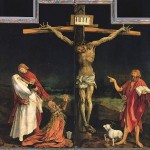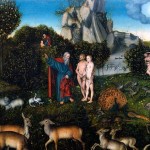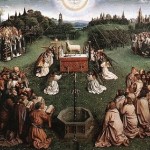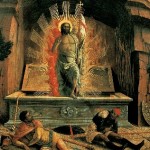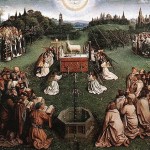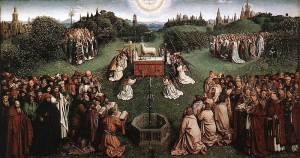 Many definitions have been given for postmodernism. To some, it is the end of the Enlightenment project with its belief in never-ending progress based on man’s reason, or the end of a single, overarching “meta-narrative” that encompasses all of reality, or the belief that there is no inherent meaning in the universe because meaning is only constructed by people. Perhaps the one characteristic of postmodernism is that there is no agreement over what it means.
Many definitions have been given for postmodernism. To some, it is the end of the Enlightenment project with its belief in never-ending progress based on man’s reason, or the end of a single, overarching “meta-narrative” that encompasses all of reality, or the belief that there is no inherent meaning in the universe because meaning is only constructed by people. Perhaps the one characteristic of postmodernism is that there is no agreement over what it means.
David Harvey has said that “Postmodernism swims, even wallows, in the fragmentary and the chaotic currents of change as if that is all there is.” He also believes that the postmodern emphasizes play over purpose, chance over design, anarchy over hierarchy, participation over distance, combination over selection, surface over depth, immanence over transcendence, and the Holy Ghost over the Father.
I believe that one good definition is simply homelessness. Postmodern man is “lost in the cosmos” and has become a plankton, floating in the world without purpose or direction. Having rejected God for the idolatry of self, only to discover that myself and other human selves make lousy gods, we woke up one day to realize that we were orphans without a home.
If 1 Corinthians 16 showed us a miniature portrait of how the Christian family and home should look, then postmodernism shows us a picture of the life that results from divorce and shattered homes. Divorce, illegitimacy, and the lack of a father in the household have been shown to contribute to poor achievement in school and throughout life, greater drug abuse, lower mortality, poorer health, and a litany of other social ills. The poverty rate for a child in a single-parent home, for example, is six times above that of a child in a married, two-parent home.
In families where the father is absent, children have lower motivation for achievement; greater inability to defer gratification for later rewards; lower self-esteem; and greater susceptibility to group influence and juvenile delinquency. The absent father family tends to produce more passive, effeminate, and dependent sons lacking in achievement, motivation and independence. Not surprisingly, those who grew up without a father are 8 times as likely to murder and 20 times as likely to be in prison.
The chaos and amorality and meaningless that we see as postmodernism is often the result of broken families, children who do not know their place in the world, and the loss of faith in and stability of any community. In a universe that we are told is without God, man is also spiritually without a home.
But our heavenly Father is not absent. He is neither so far from us that He doesn’t care or can’t help, or so close to us that He isn’t any stronger than we are. Our heavenly Father loves us so much that He has come to be with us.
“But I haven’t seen the Father – no one can,” you might say. To which Jesus has already provided the answer: “If you had known Me, you would have known my Father also; and from now on you know Him and have seen Him” (verse 7.)
“Lord, show us the Father, and it is sufficient for us,” we say.
And Jesus says: “Have I been with you so long, and yet you have not known me? He who has seen me has seen the Father.”
We have a father who is here and who has loved us enough to send His heavenly Son. This heavenly Father of ours has given us a home: heaven. “In my Father’s house are many mansions. I go to prepare a place for you” (verse 2.)
This is the answer to our postmodern condition: that man has a home again. After being evicted out of his original home, the Garden of Eden, for violating the terms of contract for tenancy, he has been ever since without a home. Not so much a man without a country but mankind without a heaven.
But through Jesus Christ, the Father has given you a home, and that home is heaven. That home is God Himself, who has promised to dwell with His people so that they may dwell in Him. Just as Jesus is in the Father and the Father is in the Son, we are in Christ, as He is in us through the Holy Spirit.
We have a home! We know where we belong. And in this home, we have something else: we have a family. In our heavenly home, in God’s family, we have the kind of fellowship and relationships that God the Father has with God the Son and God the Holy Spirit. We understand that we are now all part of one Body, and that Body is the Body of Jesus Christ.
This is the answer to postmodernism: that God is in heaven, preparing an eternal home for us, to which we shall one day be resurrected.
And though heaven is our home, because heaven is wherever God is, there is a part of heaven on earth already here: it’s called the Church, the New Jerusalem that descends from heaven. And though we are still imperfect and have not yet been fully changed, Christians, above all others, should know who and where they are.
We have a heavenly Father who loves us and lives with us through His Son and Spirit, and we have an eternal home.
Therefore, let not your hearts be troubled, but believe in God.
Prayer: Our Father, who art in heaven, hallowed be Thy name. Thy kingdom come. Thy will be done, on earth as it is in heaven. Give us this day our daily bread. And forgive us our trespasses, as we forgive those who trespass against us. And lead us not into temptation, but deliver us from evil. For thine is the kingdom, and the power, and the glory, for ever and ever. Amen.
Points for Meditation:
- Meditate on the perfections of your heavenly Father. In what ways is He like an earthly father, only perfect?
- Meditate on the passage as if Jesus were speaking to you. What words or phrases are especially meaningful to you? Allow these words to sink into you; allow yourself to be encouraged or strengthened, to rejoice, to give thanks, or to feel peace.
Resolution: I resolve to come to my heavenly Father today, seeking the one thing I need most: forgiveness, strength, comfort, faith, joy, etc.
Adoration of the Lamb, Hubert and Jan van Eyck – U.S. Public Domain

